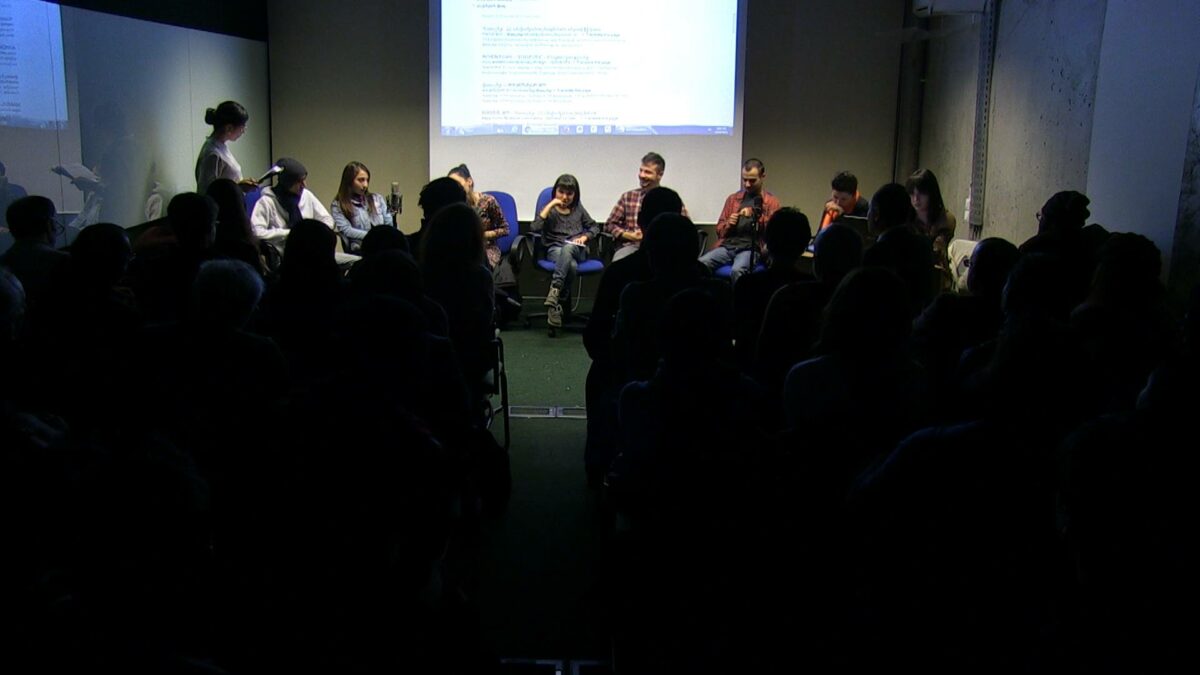
Recently staged in Armenia, the theater performance Verapatmum [translated as “Rewriting History,” but more accurately is “retelling history”] became an experience where the fundamental right and principle to ask questions was applied.
Verapatmum is a “documentary-improvisation” created with the efforts of a small group, which is staged using the technique of verbatim. The dialogue and action is based on interviews with real people which are recorded and transcribed in advance, later becoming dramaturgical texts and acting material.
Also working with this technique are writers, who bring literature and journalism as close as possible and link them. 2015 Nobel laureate Svetlana Alexievich writes her novels with this technique, using the format of first-person interviews. Verbatim, after all, means “literally”.
Verbatim isn’t a genre, but a tool through which both pamphlets and dramas can be staged. But in all cases there must be documentary raw material, since it’s assumed that the performances are fast and pressing, like flying journalists, but, at the same time, a little more than news stories that have caught the day’s hot topic.
The essence of performances conducted with this technique is rhythm: they emerge quickly, transform quickly, and die quickly, if they don’t transform well after playing a few times.
Verapatmum (director and creator Nanor Petrosyan) is constructed around the question of what young people know about the last few decades of Armenia’s history. That is, about their parents’ youth and the formation of Armenia’s years of independence.
The director conducted interviews with several 20-year-olds and combining and editing their remarks, created the dramaturgy. The young people, who aren’t actors, play their roles — sometimes saying pieces by heart and sometimes improvising.
Everyone sits as people usually sit during televised shows and create the illusion of debate. There’s also the image of a presenter of this theatrical show, who asks questions, interrupts or continues the flow of the talk show personalities’ memories (family, living conditions in the 90s, unconnected thoughts on politicians, the Karabakh War, presidential elections, Mar. 1, 2008, and so on).
We are faced with a task: to doubt history and determine who are the writers of history.
And it turns out that history is like porridge, mush, where whoever managed to added, edited, distorted, or erased what they could. The young people’s memories and thoughts are so jumbled and fragmented that it’s difficult not only to understand them, but also to simply follow the monologues/dialogues.
Ultimately, there are as many histories as there are people. And the more histories, the more interpretations. And then the interpretation of the interpretations…
History is inconceivable as documentary, but it’s always retold as improvisation. And so, it’s always subjective. This is the sort of simple and even trivial conclusion that is made after watching Verapatmum.
Working alongside the shortcomings of this experimental theater piece (mainly connected to the scarce acting) is also the very pleasant and substantial illustrative background. Everything that is discussed or reminisced is visualized on the screen — through online search engines.
The director searches for the re-tellers of history, but doing it the best and very theatrically is the automatic system: our dear friend Google.
Another actor in the performance, the secretary with sex appeal, sitting on the stage gives orders to Google and magnifies on the screen the historical events, places, objects, and encyclopedic edges to which at least a passing reference is made. For example, the performers spoke about the years when there were regular power outages or about the residents of Buzand Street, and immediately we see the search results of these key words. We saw the portrait of Faustus of Byzantium (P’awstos Buzand) (who would’ve thought?) and a Wikipedia entry titled “Dark and cold years” (and why not? It’s already a myth, albeit in a negative and disrespectful tone).
Google with its first page and hierarchical arrangement of information re-tells history better than the rest.
Ultimately, this is what those who want to become familiar with history will do. Young people who haven’t personally experienced Armenia’s shocking changes will learn about them not so much from their parents or fossilized textbooks, but more so by pressing the “search” button and googling their question.
What’s important is to know how and with which words to ask the question. What’s most important is the question.
Nune Hakhverdyan
The views expressed in the column are those of the author's and do not necessarily reflect the views of Media.am.


Add new comment
Comments by Media.am readers become public after moderation. We urge our readers not to leave anonymous comments. It’s always nice to know with whom one is speaking.
We do not publish comments that contain profanities, non-normative lexicon, personal attacks or threats. We do not publish comments that spread hate.